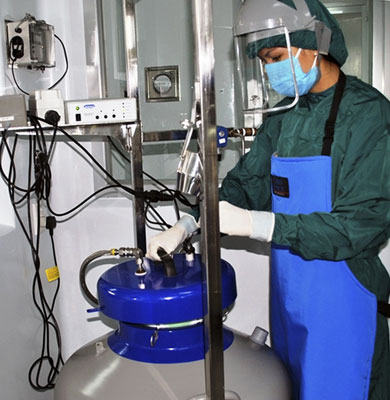
Stem cell transplant in Vietnam has saved thousands of lives, especially those with blood-related diseases, but despite its great potential and vast demand, the supply of stem cells is still relatively low.
Huge storage facility for stem cells
The MekoStem bank under the management of Mekophar Chemical Pharmaceutical Joint Stock Company came into operation in February 2009 at a cost of VND10 billion (approx. US$479,390), funded mainly by the Ministry of Science and Technology.
 |
| Stem cells storage facility in the MekoStem Bank (Photo: SGGP) |
Being the first stem cell bank in Vietnam, it is collaborating with related organizations such as the Vietnam Military Medical University, the National Institute of Hematology and Blood Transfusion, Tu Du Hospital, the Vietnam National Institute of Burns, and the Institute of Biotechnology to build a bank for stem cells extracted from umbilical cords.
Taking advantage of a modern method called ‘cell isolation technology’, which was delivered by Cell Research Corporation in Singapore to preserve and store stem cells (both cord blood and cover), the bank is trying its best to help other hospitals cure blood-related diseases.
Thanks to its vast storage facility and high-tech methods, MekoStem can now process around five to ten umbilical cords per day and accumulate tens of thousands of samples.
Similarly, the stem cell bank of the Ho Chi Minh City Hospital of Hematology and Blood Transfusion came into operation in 2004 after five years of construction. Besides storing cells from umbilical cords, it can also stock stem cells from blood and bones as well as culture new cells from mesenchymal tissues, which is another first in Vietnam. At the moment, this bank has around 3,000 samples of stem cells, most of which came from donors.
Lately, board members of the Saigon Hi-tech Park, located in District 9 of HCMC, approved a construction project for an Institute of Biotechnology, at an investment cost of $11 million from Vietnam Mamprotech Company. Upon completion, this institute will conduct research and manufacture biomedical products such as protein and diagnosis kits using cell technology.
According to Tran Trung Dung, head of the Stem Cell Bank under the HCMC Hospital of Hematology and Blood Transfusion, once all treatment methods become ineffective, stem cell transplant is the last yet very effective resolution. Thanks to state-of-the-art technology that we possess, it is possible to store stem cells for as long as 18 years, said Trung.
More stem cell donors needed
As stated by Dr. Le Van Dong, deputy head of the Immunology Department of the Vietnam Military Medical University, in the case of a patient with spinal cord injury, cirrhosis, blood-related diseases, tumors, coronary thrombosis, diabetes, stroke, or Parkinson’s disease, stem cell transplant is the ideal answer.
Up till March 2012, the National Institute of Hematology and Blood Transfusion had already performed stem cell transplant on 44 cases. The success rate for multiple myeloma and bone marrow are 70 percent and 75 percent respectively. After six years of treatment, some patients still lead a normal life, which is quite an impressive result.
Despite its usefulness, stem cells are not getting adequate attention from the public. In three years, MekoStem has received only 600 requests from healthy people to store stem cells for future use and have collected 300 samples from donors.
Statistics show that out of ten thousand samples of stem cells, there are only a few compatible ones that can be used. The compatible rate between parents and children is merely 50 percent, and between siblings is 25 to 100 percent.
“The more stem cell samples we can get from donors, the more successful we will be in curing patients,” said Pham Van Phuc of the Laboratory for Research and Application of Stem Cells (under the management of the HCMC University of Science).
The biggest obstacle, according to Phuc, is finance. It costs about $2,000 to analyze, process, and then store stem cells in the first year and then $150 per year for the following years, making the total fee of $5,000 for 18 years.
However, this price is still quite cheap, only VND15,000 per day ($0.72), for the magical benefits of results gotten from stem cells.

 Previous page
Previous page Back to top
Back to top







